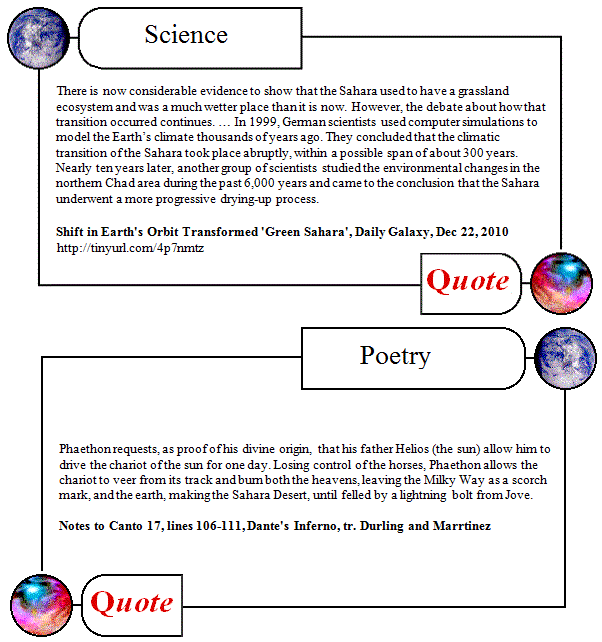DoubleQuotes and Questions
[ by Charles Cameron ]
You know, I really enjoy building my DoubleQuotes. They can be entirely frivolous, as is this one, for instance:
with its touch of gothic — a taste I share with my friend Bryan Alexander.
Or they can work like a Necker cube, offering opposite framings with which to view a single topic — in this case, video games.
They can also work like Rorschach blots — this one compares two prophecies, one from the Quran and one from a contemporary Christian prophet (if I’m not mistaken, President Obama quoted him recently) —
— but it is left up to the reader to determine the value of each…
And they can also pose fundamental questions of preference:
Has science simply replaced myth, d’you think? or is science for the facts, perhaps, and the mind — while poetry and myth are for the heart, and truth?







January 29th, 2011 at 2:21 am
Re: Kim Clement, I’ve made this before, but you (Charles) have a pattern of making very strange claims regarding Christianity. Earlier you claimed portions of the Bible were abrogated (when I know of no Christians who believe this); now you are claiming that Clements is a Prophet (where with the exception of groups which are as ‘Christian’ as NOI is ‘Islamic’, Christians believe that new revelation ended in the years immediately following Christ).
January 29th, 2011 at 5:05 am
Correction: some Christians believe new revelation ended in the years immediately following Christ. Other Christian denominations believe differently.
January 29th, 2011 at 6:01 am
Hello again, Dan:
.
You write:
Sigh.
.
In Luke 10. 34, Christ instructs his disciples, "Go your ways : behold , I send you forth as lambs among wolves. Carry neither purse, nor scrip, nor shoes: and salute no man by the way."
.
Later, in Luke 22. 35-36, we read, "And he said unto them, When I sent you without purse, and scrip, and shoes, lacked ye any thing? And they said, Nothing. Then said he unto them, But now, he that hath a purse, let him take it, and likewise his scrip: and he that hath no sword, let him sell his garment, and buy one."
.
In other words, Christ revoked, rescinded, or abrogated his previous instructions.
.
I am not saying that there is a Christian doctrine named abrogation, nor that all theologians would use the term abrogation in this particular context, nor indeed that a doctrine of "abrogation" is as central to Christian hermeneutics as it is to a significant strand in the hermeneutics of Islam – but the word is used by theologians from time to time.
.
Anthony C. Thiselton speaks of "the view that new creation in Christ abrogates the creation ordinances of the OT (which Rosner, Yarbrough, and others identify behind much of Paul’s theology in I Corinthians 5-7)" in his The First Epistle to the Corinthians: a commentary on the Greek text, Eerdmans (2000), a volume in The New International Greek Testament Commentary series.
.
There is discussion of the phrase, "Christ alone fulfills the law" in Albert Rabil, A Comparison of Erasmus and Luther on Romans, (University Press of America (1993) p. 171, where you’ll find the phrase, "he means by this, not that Christ is the completion of the law, but rather that Christ abrogates the law."
.
See also, "However, the coming of Christ abrogates the Old Law and institutes a New Law in its place" in A. L. Griffioen, "’In Accordance with the Law’: Reconciling Divine and Civil Law in Abelard", American Catholic Philosophical Quarterly 81:2 (2007).
.
*
.
You also write:
I am presenting a claim that is made by the "New Apostolic Reformation" – the movement of which Thomas Muthee, who famously anointed Sarah Palin, is a member — about Kim Clement, who was in fact recently quoted by President Obama.
.
The NAR sees apostles and prophets in the hundreds these days, and I was careful not to make any claims of my own on that topic – I specifically said, "it is left up to the reader to determine the value of each"
.
I do not much like the idea of “compulsion in religion”. I have no wish, for instance, to impose my own
theological views on M. Fouche.
January 29th, 2011 at 4:21 pm
@ Charles Cameron – this is off-topic but I will try and pull some links for your request for a jat-sikh Canadian gang post at Chicago Boyz. I’m not sure when – or if – I’ll get to it but here is a link for starters:
.
http://www.the-nri.com/index.php/2010/10/domination-of-indian-gangs-vancouver-canada/
.
http://thelangarhall.com/canada/wayward-warriors-and-sikh-imagery-in-gang-violence/
.
I know nothing about this topic other than references I’ve run across on Indian and South Asian Canadian/American blogs.
.
– Madhu
January 30th, 2011 at 8:43 am
Thanks, Madhu — much appreciated!
January 31st, 2011 at 11:17 pm
@Charles,As I’m not a Lutheran I’m all for hit-pieces against Luther (or, for that matter, academic love-letters to Erasmus), but some context here. For a Christian writer to claim that so-and-so asserts that Christ ‘abrogated’ the law is a hit on so-and-so: likewise, if you ever find a Chinese source that says some official suppots de facto independence for Taiwan, you really need to consider whether the source you are using is an attack on that official.Of course, you back off your claim almost entirely:"I am not saying that there is a Christian doctrine named abrogation, nor that all theologians would use the term abrogation in this particular context, nor indeed that a doctrine of "abrogation" is as central to Christian hermeneutics as it is to a significant strand in the hermeneutics of Islam – but the word is used by theologians from time to time.
"So you are certainly correct that abrogation is not taught by any mainstream Christian church, that it is an Islamic, and not a Christian, doctrine, but that a theologian may from time to time claim another theological believes it in a hit piece.I don’t have access to the article on Abelard you cite, so I can’t comment on that.On the second claim…You cite as Kim Clement as a "contemporary Christian prophet," and then note that it is up to the reader to "determine the value of each [passage]." Just as if I would state that bin Laden is a "respected Islamic scholar" though it is up to the reader to determine the value of his words, the slur is in associated a cultist with the orthodoxy of a religion.
February 1st, 2011 at 3:52 am
Early one Sunday morning, I happened to start watching some televangelist’s program on the local television station. This was a few years ago, and the televangelist was that sort that sits behind a desk, alone in the room besides perhaps a cameraman, discussing the Bible and meanings held within the Bible. (i.e., it wasn’t the sort of program in which a church service is broadcast.) The thing that struck me most, mostly because it was so unexpected, was that he spent the entire 30 minutes talking about how various parts of the Old Testament had been abrogated, and that Jesus had delivered a new covenant that would hold between his followers and God, a new covenant that entirely replaced the old covenant. He specifically spoke in terms of one covenant entirely replacing another covenant; and, I seem to recall his mentioning the 10 Commandments as having been a part of the old covenant that had been replaced…On this latter assertion, I might be wrong. It was a fairly odd thing to see broadcast to everyone in the area.
February 1st, 2011 at 3:54 am
New Covenant Theology @ Wikipedia:
http://en.wikipedia.org/wiki/New_Covenant_Theology
February 1st, 2011 at 5:06 am
Well so…the subject has occupied my time tonight. Found a very good pdf which gives what seems to be a solid description of New Covenant Theology, called "Introduction to New Covenant Theology" @ http://www.tms.edu/tmsj/tmsj18f.pdf
…..
First half or so concerns the relatively recent advent of NCT (circa the 1970s), some figures involved, and its relative dependence on self-publishing and now the Internet. It’s something of a grassroots movement originating from Reformed Baptists, generally on a church-by-church if not entirely Internet basis. Second half of the article jumps into the major tenets or positions — which are general rather than specific, because the movement is still relatively new and forming. One quote from the 2nd half:
;
February 1st, 2011 at 5:28 am
[ Curtis slipped past me with some interesting posts while I was formulating this post of mine ]
.
Hello again, Daniel:
.
I’m finding it hard to follow the first part of your commentary — in part perhaps because the comments software here makes it difficult for people to separate paragraph from paragraph and section from section, perhaps also because it doesn’t allow you to correct an extra quote mark here or typo there — so let me just answer the second.
.
Recent posts of mine here with prophetic and or apocalyptic content have quoted a Free Presbyterian minister who regards the Papacy as Antichrist, Martin Luther, Muhammad, and a member of C Peter Wagner’s New Apostolic Movement, and drawn comments from [at minimum] a Catholic, a "dispensational" Evangelical, and a Latter-day Saint.
.
I write here, almost always, as a student of religions. Muhammad is considered the "seal of the Prophets" in Islamic circles, Joseph Smith is considered a prophet by Mormons, and the NAM considers Kim Clement a prophet. Only today I received an email from an NAM mailing list which began "When a prophet such as Kim Clement says several times that something is at hand, he means, ‘It’s here NOW." Look at your hand. How close is it? Your hand is here, right NOW!’"
.
I am not judging between various truth claims here, I am studying and at times comparing and contrasting them — and in an attempt at courtesy, I use the nomenclature proper to each.
.
As to bin Laden, I will take Michael Scheuer’s word and that of others who have known or studied him that he is a pious man. I do not believe he has ever claimed to be a scholar of Islam, but what I have read of him seems to be consistent with what I have read of the teachings of the global-jihadist sub-section of Salafist Sunni Islam. Others may believe "that’s not Islam" or "that’s the only Islam there is" — that is their prerogative. As a student of religions, I would have trouble believing that either assertion has enough nuance to be particularly helpful in understanding the man, or the movement of which he is part.
.